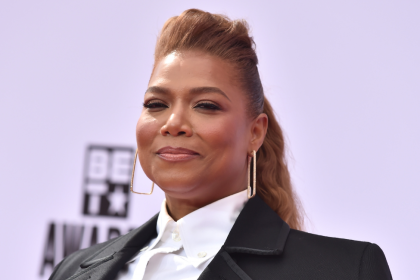On Nov. 1, 1989, the world of hip-hop got a good look at its newest female superstar. All Hail the Queen wasn’t the very first appearance of New Jersey rhymer Queen Latifah — she’d dropped her first single “Wrath of My Madness” a year earlier; but it was the first fully-realized statement from the Queen. The album spawned hit singles “Dance For Me,” “Come Into My House” and the uber-classic “Ladies First,” and it established Queen Latifah as a strong personality and top-tier rapper. She was both round-the-way-girl and feminist soul sister; whereas contemporaries MC Lyte was more of a confrontational battle rapper and Salt N Pepa mixed sass and sex appeal; Latifah was the Afrocentric homegirl-next-door.
The album itself was and still is a masterpiece. Latifah, with production from Mark the 45 King and Prince Paul, offered a sterling mix of battle raps, party anthems, Native Tongues quirk, house music, dancehall and R&B. Her rhymes are nimble, clever and insightful, and despite guest appearances from the likes of De La Soul and KRS One, Latifah never relinquishes center-stage. Later albums may have sold more, but Latifah never released a full-length as top-to-bottom brilliant as All Hail … one of the greatest hip-hop debuts ever released and a frontrunner for greatest hip-hop album ever released by a female artist.
Of course, Latifah’s reign was just beginning. She would release two more successful albums, 1991’s Nature of A Sista and 1993’s Black Reign, before her rap career gave way to other ambitions. She launched her own Flavor Unit imprint in 1991, would become an actress on both film and television with appearances in Jungle Fever and a starring role on FOX’s hit sitcom “Living Single.” Those early forays into various forms of media set the stage for her full-on breakthrough into super stardom in the late 90s and early 2000s; during which she launched her first talk show, became one of the faces of CoverGirl makeup, established herself as an A-list movie star, released Grammy-winning albums of jazz singing and was nominated for an Oscar for her performance in Chicago.
In the 25 years since she released her debut album, Queen Latifah has become one of the more influential black women in entertainment. She’s produced films like The Perfect Holiday and Just Wright, as well as television shows like “Single Ladies” and “Let’s Stay Together.” She returned to daytime television in 2013 with her second talk show and in the mid-2000s, she launched the Sugar Water Festival Tour alongside Jill Scott and Erykah Badu. Latifah, alongside peers such as Ice Cube, Will Smith and Jay Z, was a part of a generation of hip-hop stars that had ambitions to become influencers in the world of media and she’s fully realized the majority of those ambitions. She’s as much a media titan as anyone in entertainment and her journey has been remarkable to watch. Not bad for a girl from East Orange.
All hail, indeed.













